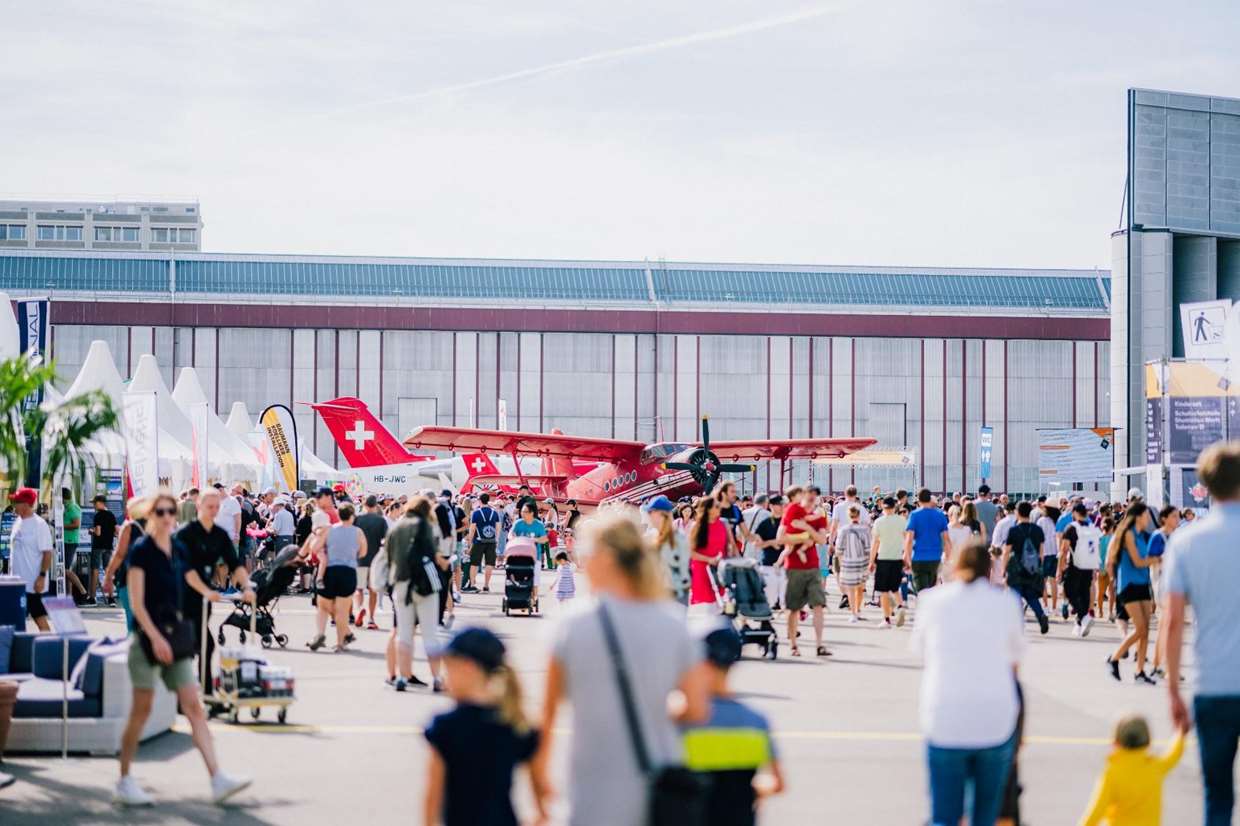Regional contribution
The Zurich Airport Group provides excellent infrastructure at its airports that benefits the entire surrounding regions.
Relevance
Zurich Airport Ltd. makes a significant contribution to economic and social development in all the regions in which its airports are located. As a responsible company and major regional player, its activities impact not only its own business, they also exert a positive influence on the wider economy and society at large. By providing flight connections to a wide range of destinations, it performs the key service of linking a region or – in the case of Zurich – an entire country to the world. Airports create jobs and generate economic value in a region, both directly and indirectly through regional suppliers and service providers. In addition, they make a valuable contribution as land-based travel hubs, as places for shopping, meeting up or leisure, and as partners in research and education. Last but not least, Zurich Airport Ltd.ʼs regional sponsorship programmes help encourage a diversity of cultural life in the regions around its airports.
Approach and progress
Direct flights as a locational advantage
The role of Zurich Airport as a European gateway to the global aviation network is both a requirement of its operating licence from the Swiss government and is anchored in the companyʼs purpose. Fulfilling this mandate for the benefit of Switzerland is an integral part of the companyʼs identity, both on a day-to-day operational basis and as part of its long-term infrastructure development.
The direct European and intercontinental flights offered at Zurich Airport provide key locational advantages for the region and Switzerland as a whole. As well as bringing tourists to the country, the excellent global links attract businesses to locate here and help them grow, in turn making the region a highly desirable place to live and work. Along with passenger transport, freight is also an important economic driver.
Zurich Airport Ltd. is actively striving to maintain existing direct flights at all its airports and launch attractive new ones by liaising closely with airlines to identify potential routes. It also aims to provide high-quality airport infrastructure across the board so that it remains attractive to airlines wishing to offer flight routes.
In the reporting year, Zurich Airport regularly served 200 destinations (2022: 195) in 72 countries (2022: 73). The number of destinations served by direct flights was therefore higher than ever before.
Regional value creation
The Zurich Airport Group makes a major positive contribution to wealth creation in the regions where its airports are located. As well as its own investment and expenditure, the countries concerned benefit indirectly from taxes and income from charges.
Every year the company invests several hundred million Swiss francs in infrastructure development. Since its privatisation in 2000, it has invested an average of CHF 1 million per working day in developing and maintaining Zurich Airport. It consequently helps to shape the regionʼs identity, provides jobs and income, and is a major commissioner of construction work. See the Business update section for information on current development projects.
Over the course of 2023, Zurich Airport Ltd. also invested considerable sums of money in infrastructure at its sites abroad. Notable investments include construction of the new Noida Airport in India, the new runway in Macaé in Brazil, and the expansion and upgrading of the Iquique Airport terminal in Chile.
Through supplier and service relationships, other companies and their employees also benefit from these investments. Where service levels are comparable and public procurement rules permit, Zurich Airport Ltd. gives preference to local companies when awarding contracts.
The importance of local procurement relationships at the Zurich site is evident from the volume of contracts awarded to local suppliers in the cantons of Zurich, Zug, Aargau, Schaffhausen, Thurgau, Schwyz and St. Gallen. In the year under review, 81.7% (CHF 472.2 million) of the relevant procurement total of Zurich Airport Ltd. approximately CHF 578.1 million went to local companies.
Zurich Airport Ltd. counts as a government contracting entity in the transport sector and is therefore obliged to comply with public procurement law. This applies both to procurements covered by the relevant international treaties as part of GATT/WTO or with the EU and those not covered by such agreements. Procurements are put out to tender in accordance with federal law. Further information may be found in the Anti-corruption and Human rights sections.
Zurich Airport Ltd. regularly commissions a study on the economic importance of Zurich Airport. According to the latest study conducted in 2022 by the research and consultancy firm Infras AG, the airport generates approximately CHF 7 billion annually for the economy. This is equivalent to around 4.4% of the gross domestic product of the canton of Zurich, or just under 1% of Switzerlandʼs total GDP.
The companyʼs business activities also benefit the regions and countries where its airports are located thanks to the charges and taxes they generate. Since privatisation in 2000, Zurich Airport Ltd. has paid direct taxes of around CHF 810 million in Switzerland and CHF 517 million in dividends has flowed into the public purse. In financial terms alone, its contribution thus amounts to more than CHF 1.3 billion over the last 23 years. The Swiss Confederation accounts for 19%, the Canton of Zurich for 53%, the City of Zurich for 5% and other towns and municipalities for 23%.
In the case of its international subsidiaries, concession fees for the operation of the airports concerned are also paid to the respective governments. These fees are payable either at the time the concession agreement is signed or are spread over the term of the concession. Details can be found under note 24.7, Concessions for the operation of foreign airports.
Meeting and recreation spaces
Airports are more than just the start and end points of flights, they are also commercial centers and places where all manner of people come together. By offering access to shopping malls, service providers and a wide range of leisure facilities and experiences, Zurich Airport plays an important role in the everyday lives of the people who live and work in the region.
Zurich Airport furthermore functions as a central public transport hub for the area to the north of the City of Zurich, connecting to both local and intercity services. With around 450 train, 400 tram and 700 bus services daily, Zurich Airport is one of the best-connected locations in Switzerland. A statutory requirement in relation to access journeys to the airport stipulates that the proportion of public transport used must be at least 46% by 2030. At the time it was last measured in 2017 this figure was 44%.
With its diverse range of offerings, Zurich Airport Ltd. enables a wide audience to experience Zurich Airport. In the year under review, the standout attraction was undoubtedly the festival to celebrate the airportʼs 75th anniversary. It drew in over 140,000 visitors over three days of celebrations in September. A large number of guided tours and bus trips run almost every day throughout the year, some in collaboration with the airportʼs partner companies. The observation decks enable visitors to experience flight operations up close. On average around 300,000 people visit them each year.
The airport is also a popular place to hold conferences, business meetings and events of all kinds. The Circle and adjacent 80,000 m2 of recreational green space also provide further opportunities for spending time, exploring or meeting up with people.
With numerous cafés and restaurants, plane spotting locations and nature conservation areas, the extensive environs around Zurich Airportʼs runways also offer further recreational spaces that draw additional visitors. Zurich Airport Ltd. is keen to maintain these attractive amenities around the airport in future. The popular plane spotters’ hill on the western side of the airport was removed during the year under review to make way for the “Zone West” construction project. There are plans to rebuild it at another location with an even better view of the activities on the airfield.
The table below shows participant numbers for visitor activities at Zurich Airport. Due to the restrictions imposed during the Covid-19 pandemic, the figures are not directly comparable.
|
Zurich Airport Ltd., Zurich site |
|
Unit |
|
2019 |
|
2020 |
|
2021 |
|
2022 |
|
2023 |
|
Guided tours and bus tours conducted |
|
Number of groups |
|
3,456 |
|
856 |
|
1,482 |
|
3,177 |
|
3,420 |
|
|
Number of persons |
|
71,614 |
|
14,741 |
|
26,956 |
|
63,659 |
|
70,314 |
Where possible, Zurich Airport Ltd. is developing concepts for positioning airports as recreational destinations at its subsidiaries abroad too. Florianópolis in Brazil has a leisure and recreation “Boulevard 14/32” with over 11,000 m2 dedicated to dining, shopping and concerts. 26 events were held during the year under review, attended by a total of 65,000 people. 730 visitors also took part in 26 guided tours of the airport.
Partner in research and education
Zurich Airport Ltd. supports universities and organisations engaged in research and teaching, and makes an important contribution in a regional context too. It makes personnel available to universities and institutions such as Zurich University, the Swiss Federal Institute of Technology (ETH) in Zurich, the Zurich University of Applied Sciences (ZHAW), the University of St. Gallen (HSG) or the Lucerne University of Applied Sciences and Arts for practice-centered lectures, assisting with case studies or reviewing dissertations. Universities and organisations furthermore make use of Zurich Airportʼs resources as a platform for hands-on research into new technologies, in particular for aviation-related topics, but also generally in various other areas. The collaborative focus here is on the development and utilisation of technologies and processes for improving operational safety and efficiency and on mitigating environmental impacts. Zurich Airport Ltd. also plays a role in providing graduate employment opportunities.
Sponsorships and partnerships
With its regional sponsorships, Zurich Airport Ltd. contributes to a vibrant civil society in Zurich as well as to sport and culture in the region. Alongside smaller local clubs and non-profit organisations, Zurich Airport Ltd. also supports town and village festivals and various cultural events in the Zurich region. As well as purely financial support, it also provides services in-kind.
As Zurich Airport Ltd. is its main sponsor, in Zurich the highest monetary sponsorship during the reporting year went to the Young Flyers. Over 720 youngsters belong to this ice hockey association. Many smaller local clubs and organisations also benefited from sponsorship money. The company furthermore has strategic partnerships with some individual organisations such as Switzerland Tourism, Zurich Tourism, the Swiss Museum of Transport, Food Zurich and the Zurich Film Festival.
At its locations abroad, Zurich Airport Ltd. organises and supports community activities that benefit local people. In Brazil, these include cultural events as well as more socio-ecological projects such as “Água e Vida”. This campaign aims to educate and raise awareness about protecting the oceans and organises annual beach clean-ups at each site. In Vitória, information panels about protecting coastal vegetation were also funded and set up at Curva da Jurema, a section of beach in the vicinity of the airport. The project also included topic-related NGO-run events in surrounding districts. In cooperation with the authorities in Chile, various awareness-raising campaigns were run at the airports there, including on road safety and preventing domestic violence.
At Noida in India, community engagement with the surrounding municipalities is very important. Run in conjunction with an NGO, an educational programme to provide vocational training for young adults benefited 75 people during the reporting year. Various courses were offered, ranging from basic computer skills to rescue services to bookkeeping. Once the airport has commenced operation, investment in areas such as medical services, schools, the provision of drinking water or roadbuilding are planned over a period of five years, for example installation of manual water pumps or the renovation of a school building.




